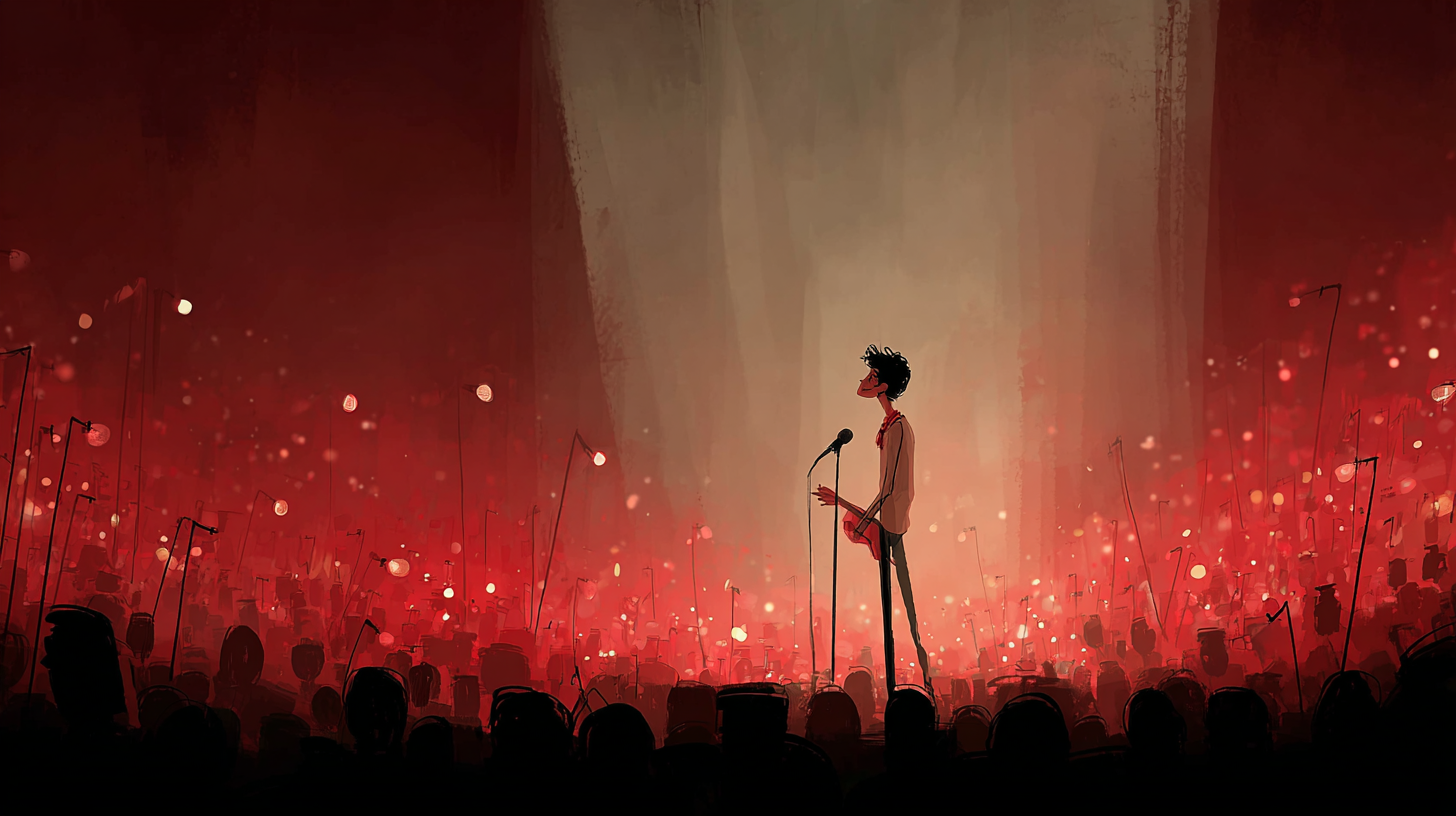Something that makes people enjoy themselves.
人を楽しませるためのこと(娯楽)
以下は英単語 “entertainment” に関するストーリー型学習コンテンツです。まずは大枠の意味を理解して最後の文章で確認しましょう。
主な意味(main meaning)
| 品詞 | 意味 | 発音記号 (IPA) | 英語例文 |
|---|---|---|---|
| 名詞 | 楽しませること、娯楽、楽しみ | /ˌentərˈteɪnmənt/ | The concert was great entertainment for the audience. |
語源(etymology)
ラテン語「intertenere(引きつける、保つ)」に由来。
核イメージ:「人の注意を引きつけて楽しくさせること」
類義語(synonyms)
| 類義語 | 意味 | 英語例文 |
|---|---|---|
| amusement | 楽しみ、娯楽 | The park offers a lot of amusement for children. |
| recreation | 気分転換、娯楽 | Swimming is a popular form of recreation. |
| pastime | 気晴らし、趣味 | Reading is my favorite pastime. |
| fun | 楽しみ、面白さ | We had so much fun at the party. |
反義語(antonyms)
| 反義語 | 意味 | 英語例文 |
|---|---|---|
| boredom | 退屈 | The long speech was full of boredom. |
| work | 仕事 | He has no time for entertainment because of too much work. |
コロケーション(collocations)
| コロケーション | 英語例文 |
|---|---|
| live entertainment | The hotel provides live entertainment every night. |
| entertainment industry | She works in the entertainment industry. |
| family entertainment | The movie is suitable for family entertainment. |
| source of entertainment | Television is a common source of entertainment. |
2項表現(binomials)
| 2項表現 | 英語例文 |
|---|---|
| fun and entertainment | The festival was full of fun and entertainment. |
| leisure and entertainment | The resort offers leisure and entertainment for visitors. |
英語ストーリー(english story)
Story:
Tom had always wanted to work in the entertainment industry. When he was a child, television had been his biggest source of entertainment, and he often imagined himself on stage, performing for people. As he grew older, he realized that music was not just fun and entertainment but also a way to connect with others.
After finishing university, Tom got a job at a small theater. The job was not only about acting but also about helping with lights, sound, and tickets. It was hard work, and sometimes it brought moments of boredom when he had to wait backstage for hours. However, he never lost his passion, because he knew that the final performance would bring joy and amusement to the audience.
One summer, the theater organized a special event for family entertainment. Parents and children came to enjoy music, comedy, and magic shows. Tom was responsible for introducing the performers. At first, he was nervous, but once he stepped on stage, he felt a strong connection with the crowd. People laughed, clapped, and cheered. He realized that recreation like this could bring people closer together.
After the show, a director approached Tom and said, “You have talent, not only as an actor but also as a host. Would you like to join our next project?” Tom was excited. This was the opportunity he had been waiting for. He remembered his childhood dream and knew he was moving forward in the right direction.
That night, as he walked home, he thought about the meaning of leisure and entertainment. For some, it was just a way to relax. For him, it was a career, a passion, and a chance to make the world a little brighter. He smiled, knowing that his journey had only just begun.
和訳
トムはずっと**エンターテインメント産業(entertainment industry:娯楽産業)で働きたいと思っていた。子どものころ、テレビは最大の娯楽の源(source of entertainment)であり、彼はよく自分が舞台に立ち、人々の前で演じている姿を想像していた。年を重ねるにつれて、音楽は単なる楽しみと娯楽(fun and entertainment)**ではなく、人とつながる方法だと気づいた。
大学を卒業した後、トムは小さな劇場で働き始めた。仕事は演技だけでなく、照明、音響、チケットの手伝いもあった。それは大変な**仕事(work)で、時には舞台裏で何時間も待つという退屈(boredom)な瞬間もあった。しかし、彼は情熱を失わなかった。なぜなら、最終的な公演が観客に喜びと楽しみ(amusement)**を与えることを知っていたからだ。
ある夏、劇場は**家族向けの娯楽(family entertainment)の特別イベントを企画した。親や子どもたちが音楽、コメディ、マジックショーを楽しみに集まった。トムは出演者を紹介する役を任された。最初は緊張したが、一度舞台に立つと、観客との強いつながりを感じた。人々は笑い、拍手し、歓声を上げた。彼は、このようなレクリエーション(recreation:気分転換、娯楽)**が人々を近づけることができると実感した。
公演の後、監督がトムに近づいてこう言った。「君には俳優としてだけでなく司会者としての才能もある。次のプロジェクトに参加しないか?」トムは大喜びした。これは彼が待ち望んでいたチャンスだった。子どものころの夢を思い出し、彼は自分が正しい方向に進んでいると確信した。
その夜、家へ歩きながら、彼は**余暇と娯楽(leisure and entertainment)**の意味について考えた。ある人にとって、それはただリラックスする方法にすぎない。しかし彼にとって、それはキャリアであり、情熱であり、世界を少し明るくできるチャンスだった。彼は微笑み、この旅がまだ始まったばかりだと知った。
Q&A
Q: entertainment と amusement の違いは?
A: 「entertainment」は音楽、映画、劇、テレビなど広く人を楽しませるものを指します。
「amusement」は短時間の楽しみや笑いを中心にした軽い娯楽を指します。遊園地やジョークなどに使われることが多いです。
Q: entertainment と recreation の違いは?
A: 「entertainment」は「観て楽しむ娯楽」が中心です。映画・演劇・音楽などが代表例です。
「recreation」は「自分で活動してリフレッシュする娯楽」です。スポーツや散歩など体を使う気分転換が含まれます。
Q: entertainment と pastime の違いは?
A: 「entertainment」は外から与えられる楽しみを意味することが多いです(映画、テレビなど)。
「pastime」は自分が時間を使って楽しむ個人的な趣味や活動を意味します(読書、編み物など)。
Q: entertainment と fun の違いは?
A: 「entertainment」は形のある娯楽(映画、音楽、ショーなど)を指します。
「fun」はもっと広い概念で、状況や体験そのものを楽しいと感じるときに使います。例えば「友達と話すのは楽しい(fun)」ですが、それは必ずしも「entertainment」ではありません。
Q: entertainment と boredom の違いは?
A: 「entertainment」は楽しませるもの。
「boredom」は退屈でつまらない状態です。意味的に正反対の関係です。
Q: entertainment と work の違いは?
A: 「entertainment」は余暇の活動で、人を楽しませる目的があります。
「work」は義務や収入のために行う活動で、娯楽とは対照的です。
Q: entertainment と live entertainment の違いは?
A: 「entertainment」は一般的な娯楽全般。
「live entertainment」は「生の舞台・コンサート・ショー」といった直接観客の前で行われる娯楽を指します。
Q: entertainment と entertainment industry の違いは?
A: 「entertainment」は娯楽そのもの。
「entertainment industry」は娯楽を作り出し提供する産業(映画会社、音楽業界など)を指します。
Q: entertainment と family entertainment の違いは?
A: 「entertainment」は大人向けや特定層向けも含む広い意味。
「family entertainment」は家族全員が一緒に楽しめる内容(アニメ映画、家族向けショーなど)を強調します。
Q: entertainment と source of entertainment の違いは?
A: 「entertainment」は娯楽そのもの。
「source of entertainment」は「娯楽の源」で、テレビ、ゲーム、本など娯楽を生み出す手段や媒体を指します。
Q: fun and entertainment と leisure and entertainment の違いは?
A: 「fun and entertainment」は「楽しいこと全般+娯楽」という軽快な組み合わせです。
「leisure and entertainment」は「余暇+娯楽」で、よりフォーマルに「自由時間とそれを楽しむ手段」を示します。



コメント